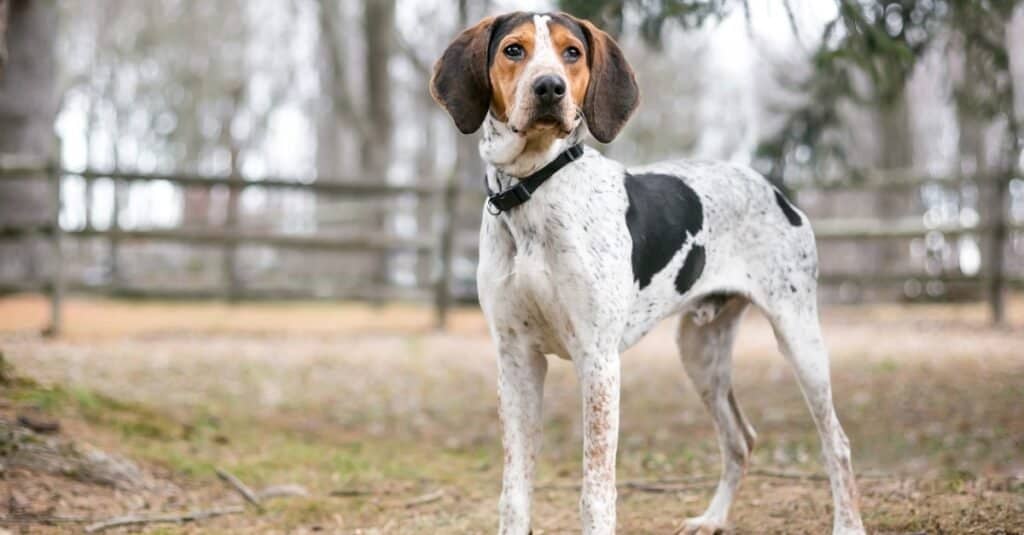An all-American breed, the treeing Walker coonhound originated in the United States during the 1700s to 1800s. This tenacious breed is courageous, loyal, and works tirelessly with energy to spare. However, when off-duty these dogs are wondrously friendly companions who love snuggling up beside their favorite human after a day of adventure. These amazing dogs are both tough and loving, but how long do they live? Let’s look at the lifespan of the treeing Walker coonhound, health concerns to watch out for, and what these energetic dogs need to live a long and happy life!
How Long Do Treeing Walker Coonhounds Live?

Treeing Walker coonhounds are mellow and even-tempered when they get enough exercise.
©Mary Swift/Shutterstock.com
On average, treeing Walker coonhounds live for 12 to 13 years. They are slow to mature and are not fully grown until they are 18 months to two years old. As adults, they typically stand 20 to 27 inches tall at the shoulders and weigh 50 to 70 pounds.
For your treeing Walker coonhound to live a long and healthy life, they’ll need plenty of exercise and mental stimulation. These dogs are bred to be active, independent hunters. They have a ton of energy and need lots of physical exercise — much more than just a short walk around the block. If they are not able to burn off all that excess energy, these dogs can resort to unwanted behaviors, like digging, chewing, and barking (and they have rather loud, booming voices).
Treeing Walker coonhounds are best for active families, and they love burning energy alongside their favorite people. They are incredibly strong and have excellent endurance, which makes them wonderful hiking and hunting companions. In addition, their short coat is very low maintenance, so you won’t need to worry too much about grooming.
However, treeing Walker coonhounds were bred as hunters with a very high prey drive. When they pick up on a scent, there isn’t much you can do to stop them from following it through. They are skilled climbers and escape artists, and will do their best to follow the scent across far distances. When you take your dog outside, always make sure they are on a leash or in a very secure, fenced-in area.
Treeing Walker coonhounds are also incredibly intelligent and do very well with training. When properly trained and socialized, they are friendly and affectionate dogs and do great around young children and even other animals.
Health Concerns to Watch for in Treeing Walker Coonhounds
Although treeing Walker coonhounds are typically healthy dogs, there are a few health concerns you’ll want to watch out for:
- Hip dysplasia
- Eye problems
- Ear infections

Although they have a high prey drive, many treeing Walker coonhounds are surprisingly calm around dogs and cats.
©Lindsay Helms/Shutterstock.com
Hip Dysplasia
Treeing Walker coonhounds are very active dogs and they love to run. In a dog with hip dysplasia, however, the pressure this puts on their joints causes problems. Hip dysplasia is the result of the ball and socket of the hip joint(s) not developing correctly. This causes the dog’s bones to grind against each other when they move, which can wear them down. Responsible breeders will screen for hip dysplasia. A veterinarian can also determine if your dog has hip dysplasia and what can be done about it.
Eye Problems
Just like humans, dogs can develop cataracts in their eyes as they get older. Cataracts block light from getting through the lens of the eye, making it difficult for dogs to see clearly. Many dogs can adjust, but in some cases, they may need surgery.
Ear Infections
Treeing Walker coonhounds have adorably floppy ears, but this also provides a perfect place for things to hide. When your dog goes outside, be sure to check under their ears for ticks. In addition, you’ll want to wipe down your dog’s ears to remove any debris and excess ear wax at least once a week. If your dog enjoys swimming, dry their ears completely when they’re done to avoid ear infections.
The photo featured at the top of this post is © Mike Piers/Shutterstock.com
Ready to discover the top 10 cutest dog breeds in the entire world?
How about the fastest dogs, the largest dogs and those that are -- quite frankly -- just the kindest dogs on the planet? Each day, AZ Animals sends out lists just like this to our thousands of email subscribers. And the best part? It's FREE. Join today by entering your email below.
Thank you for reading! Have some feedback for us? Contact the AZ Animals editorial team.







